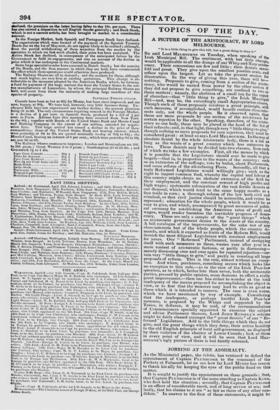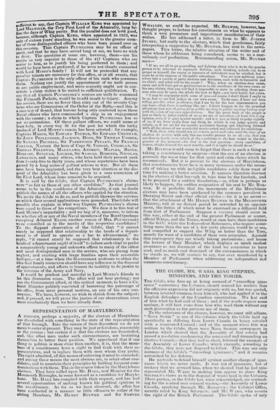JOBBING AT THE ADMIRALTY.
As the Ministerial paper, the Globe, has ventured to defend the appointment of Captain PLUMB' DGE to the command of the Packets at Falmouth, let us see how far Lord MINTO has reason to thank his ally for keeping the eyes of the public fixed on this matter. It is sought to justify the appointment on three grounds ; first, that Captain PLUMRIDGE is of the same standing as Captain KING, who first held the- situation ; secondly, that Captain PLUMRIDGZ is an officer of considerable merit, and of long service at sea; and lastly, that his claims to it are " as fair as those of any other can-. didate." In answer to the first of these statements, it might be sufficient to say, that Captain WILLIAM KING was appointed by Lord IIfacvim.g, the Tory First Lord of the Admiralty, long be- fore the days of Whig purity. But the parallel does not hold good, because, although Captain KING, when appointed in 1823, was only of sixteen years' standing, he was senior to the greater num- ber of those distinguished officers who have been passed over on this occasion. That Captain PLUMRIDGE may be an officer of merit, and that he may have served long at sea, we have no wish to deny. The questions at issue are, however, these—are his merits so very superior to those of the 417 Captains who are senior to him, as to justify his .being preferred to them ; and would he have been so preferred, if he were not closely connected with Lord MINTO'S family ? It will not be pretended that any peculiar talents are necessary for this office, or at all events, that Captain PLituaincs Is the only officer of his rank who possesses them. Nothing can justify the appointment of an unfit person to any public employment, and mere seniority ought not to con- stitute a claim unless it be united to sufficient qualification. To say that all Captain PLUMRIDGE'S seniors are unfit to command the Falmouth Packets, would be to add insult to injury. Among his seniors, there are no fewer than sixty out of the seventy Cap- tains who are Companions of the Order of the Bath,—and this is a sure test of desert, that honour being only conferred upon those Naval officers who have commanded a ship in an engagement with the enemy ; a claim to which Captain Ptiniatiincie has as yet no pretensions. Of these gallant ottieers, we could name at least forty, in every way fit for the post for which the lucky husband of Lord Mmo's cousin has been selected : for example, Captains MASON, Sir EDWARD TUCKER, Sir EDWARD CHETHAM, Sir JOHN PHILLIMORE, JACKSON, HOPE, Sir THOMAS USSHER, Sir SAMUEL PECHELL, Sir FLEETWOOD PELLEW, Sir FRANCIS COLLIER, NAPIER the hero of Cape St. Vincent, COGHLAN, Sir THOM ts FELLOWES, MARKLAND, ANDREW, MAPLES, BLOYE, MORE•qtY, SULIVAN, LOCKER, Sir SAMUEL ROBERTS, NICOLAS, LAWRENCE, and many others, who have held their present rank from t wenty-two to thirty years, and whose reputations have been gained by a long series of gallant actions in war. But all these men have been neglected, and the very best situation at the dis- posal of the Admiralty has been given to a near connexion of the First Lord, whose fame remains to be acquired. It is said by the Globe, that Captain PLUMRIDGE'S claims were "as fair as those of any other candidate." As that journal Seems to be in the confidence of the Admiralty, it can no doubt publish the names of all the officers who applied for the situation. We invite the Globe to do so, and to publish likewise the services en which their several applications were grounded. The Globe will possibly also explain in what way Captain PLUMRIDGE'S claims were equal to those of his competitors. We dare it to this test of Lord Musro's impartiality ; and we beg of it, moreover, to inform us whether all or any of the Naval members of the Board (perhaps excepting Admiral ELIOT, another cousin of Mrs. PLUMRIDOE) were consulted as to the merits of the respective candidates ? To the flippant observation of the Globe, that " it cannot
surely be supposed that relationship to the heads of' a depart- ment is of itself to operate as a bar to advancement," we reply, "it cannot surely be supposed that relationship to the
heads of a department ought of itself" to induce such chief to prefer a comparatively young and unknown officer to many of the oldest
and most distinguished men in the service, who are pining from neglect, and existing with large families upon their miserable half-pay,—at a time when the Government professes to abhor the idea that family connexion should have any influence in the disposal of appointments, and affects to lament its inability to do justice to the veterans of the Army and Navy. It would be prudent and merciful in Lord MINTO'S friends to let this discussion cease. The affair will not bear probing ; nor can the Government afford, at this critical moment, to have a Ca-
binet Minister publicly convicted of bestowing the patronage of his office, from mere personal motives, on one of his own con- nexions. We have, however, no wish to shrink from the subject; and, if pressed, we will prove the justice of our observations even more conclusively than we have already done.



























 Previous page
Previous page